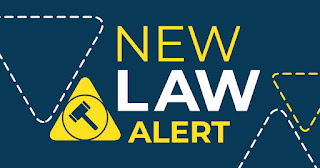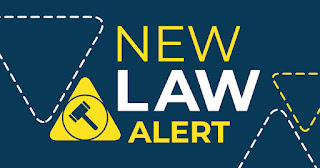Friday, November 17, 2023
Monday, July 25, 2022
Starting on October 19, 2022, fines are going to be issued to any person who obstructs handicapped parking areas at a shopping center with one to four retail stores throughout New York State pursuant to S8822.
That is not to say that this is all that can happen if landlords don't enforce and/or provide for handicapped parking at their shopping centers. Landlords who do not provide for access for the disabled can be sued under the Americans with Disabilities Act (ADA) and state specific laws like the New York State Human Rights Law (NYSHRL). So, such landlords should actively enforce their handicapped parking by also towing violators. Nonetheless, individuals who obstruct such spaces can't be sued under the ADA, so, it's a welcome sign that such obstructors will, at least, be ticketed for their thoughtless infraction.
Monday, January 10, 2022
Suffolk County renters: BEWARE! Those looking to rent in Suffolk County, New York should proceed with caution when searching for a rental home.
In an effort to protect Suffolk County tenant/residents from rental fraud, the County Legislature has amended Local Law No. 30-2021. Rental fraud is committed when a person or entity leases a residential or commercial property to another, when that person or entity does not have an ownership interest in the property or authorization from the owner to lease the property. Properties that are vacant or foreclosed upon are typically the kinds of properties that are used for rental fraud.
The law now states that "persons seeking to rent or lease real property MAY [emphasis added] demonstrate ... ownership interest or authorization to rent, lease or sublet real property." Ownership interest for real property can be demonstrated to a potential tenant via a fully signed and valid deed or a fully signed lease agreement. Similarly, a person can demonstrate they have authorization from the property owner to rent or lease the property by providing a potential tenant with proof of agency.
The problem with this new law is that the Legislature does not actually require those looking to lease out their real property to prove that they are indeed the owner of the property. If the Legislature actually wants to protect potential tenants from rental fraud, they need to revise this law immediately and require that persons seeking to rent out real property provide proof of ownership or agency authorization incident to such rental.
Those who commit rental fraud and are caught will face penalties subject to a fine of up to $1,000.00 and/or up to six months imprisonment. Do you think the punishment fits the crime?
In the meantime, potential tenants can and should take additional steps to protect themselves where the Legislature has fallen short. As rental fraud has become a hot topic in Suffolk, potential tenants should do their research, as well as request proof of ownership from those who are leasing properties. If a lessor refuses or cannot provide proof of ownership or agency authorization, it may be best to continue the house hunt.
Wednesday, December 29, 2021
As of December 22, 2021, cooperatives have received 8 exemptions from the Housing Stability and Tenant Protection Act, which otherwise restricts landlords' rights as to their tenants.
When the Housing Stability and Tenant Protection Act came out, we repeatedly tried to explain to co-op boards, property managers (managing agents), real estate brokers, local NAR boards, and courts, amongst others, that this law applied to co-ops regardless that it clearly was not the intent of the legislature. To a non-lawyer intent of the legislature matters, to a lawyer the rules of statutory interpretation matter and you never get to the intent of the legislature if the statute is clear on its face, which the Housing Stability and Tenant Protection Act is. You see, co-ops are landlords and their shareholder-owner-occupiers are tenants. This is longstanding settled law, which created a huge predicament for co-ops.
Thankfully, roughly 2 years later, the law is finally fixed as follows:
- GOL 7-108(1-a), the deposit or advance limit of one month’s rent will no longer apply to owner-occupied cooperative apartments;
- RPL 226-c, the notice requirement for rent increases of 5% or more / non-renewal will no longer apply to owner-occupied cooperative apartments;
- RPL 238-a(1)(a), the preclusion of charging fees to review applications will no longer apply to compensate managing agents and/or transfer agents for the processing, review, or acceptance of such prospective tenant’s application to become a shareholder of such co-op;
- RPL 238-a(1)(b), the cap on fees for applications of $25 is inapplicable to applications from prospective shareholders to co-ops, but the limitation of only charging up to the actual cost remains;
- RPL 238-a(2), late fees are now permitted on owner-occupied cooperative, but only up to 8% of monthly maintenance fee and only where the proprietary lease or occupancy agreement is updated to reflect such percentage;
- RPAPL 702(2), the limited definition of rent for purposes of a judgment in a summary proceeding is inapplicable to owner-occupied cooperatives to the extent that the proprietary lease or occupancy agreement is updated to reflect a different definition;
- RPL 235-e, the 5-day non-payment of rent notice does not need to be sent by certified mail to co-op owner-occupants to the extent that the proprietary lease or occupancy agreement is updated to reflect a different method of serving notice; and
- RPL 234, attorneys’ fees may be awarded to either party in the event of a default judgment concerning a co-op owner-occupant to the extent that the proprietary lease or occupancy agreement is updated to reflect the availability of such fees.
Wednesday, December 22, 2021
Starting on February 19, 2022, the maximum fine for real estate license law violations has been doubled from $1,000 to $2,000 by S945B. Brokers beware.
Further, 50% of these fines, for violating Article 12-A and 19 NYCRR 175, will be used to establish an Anti-Discrimination in Housing Fund (ADHF).
The ADHF shall be controlled by the NYS Attorney General and may be used for:
- Fair housing testing;
- Grants to duly applying county, city, town or village human rights commissions;
- Grants to duly applying county, city, town or village agencies specializing in the prevention of unlawful discrimination in housing; &
- Grants to duly applying not-for-profit agencies specializing in the prevention of unlawful discrimination in housing.












